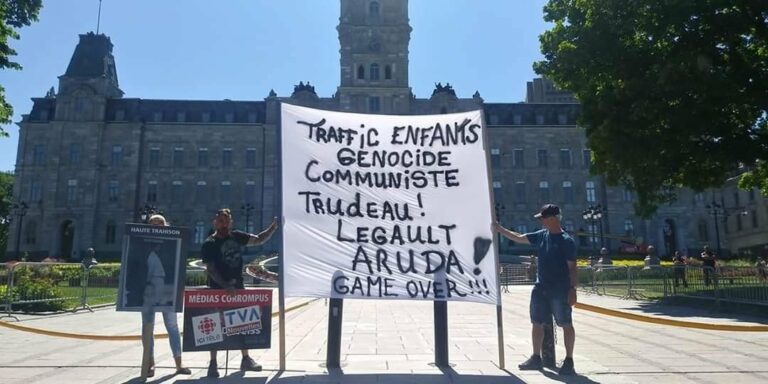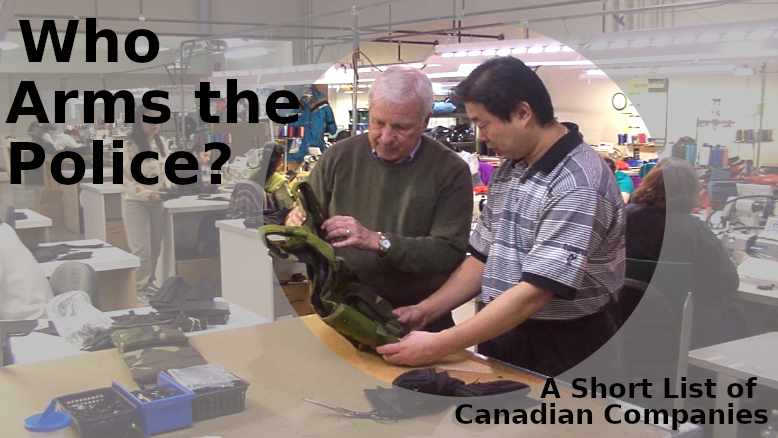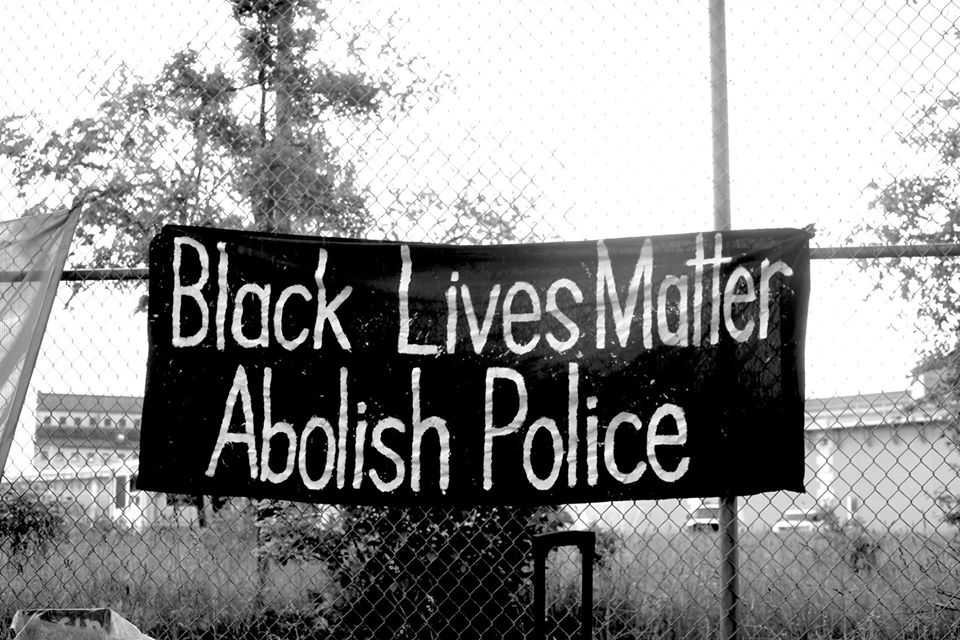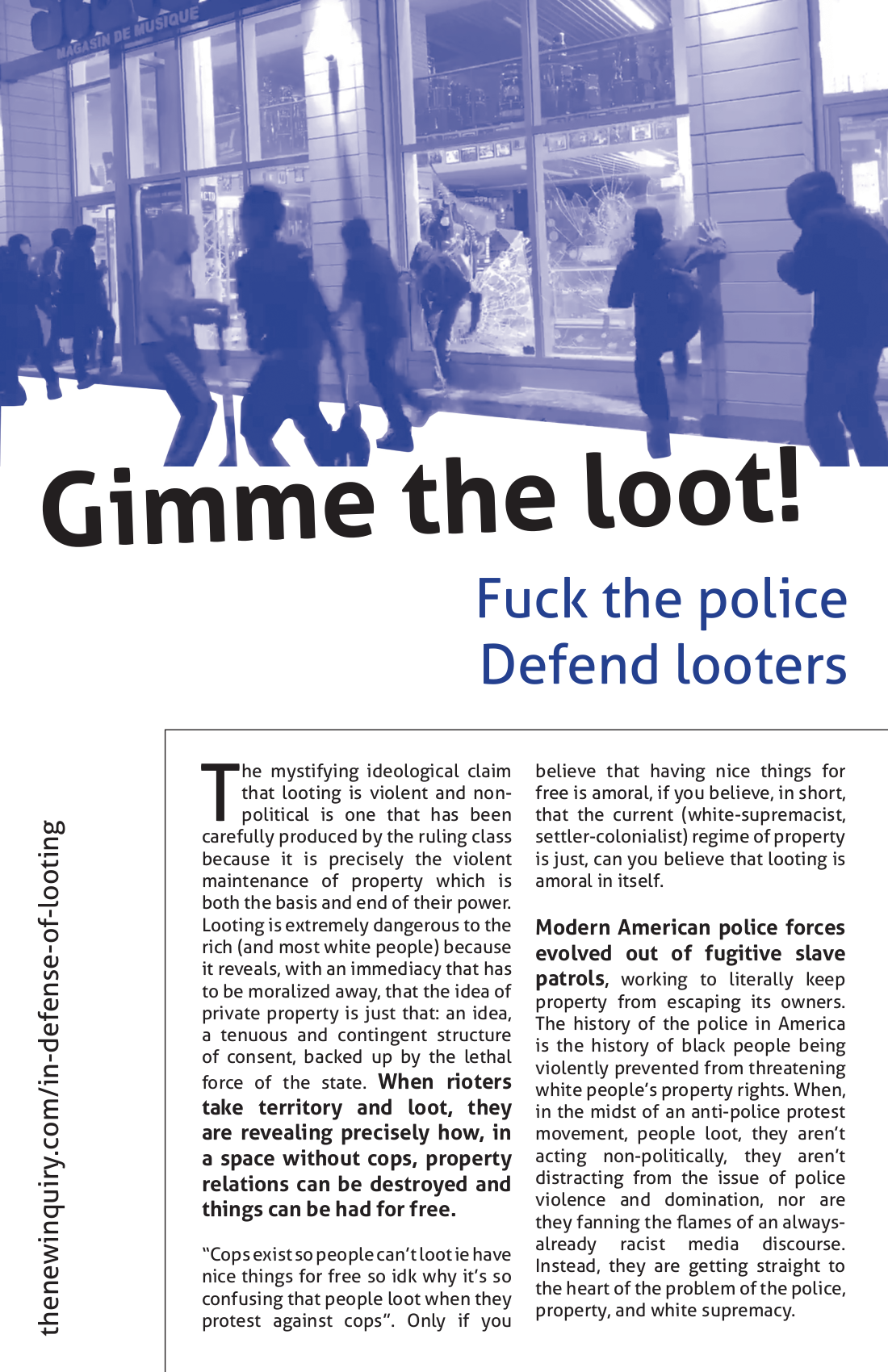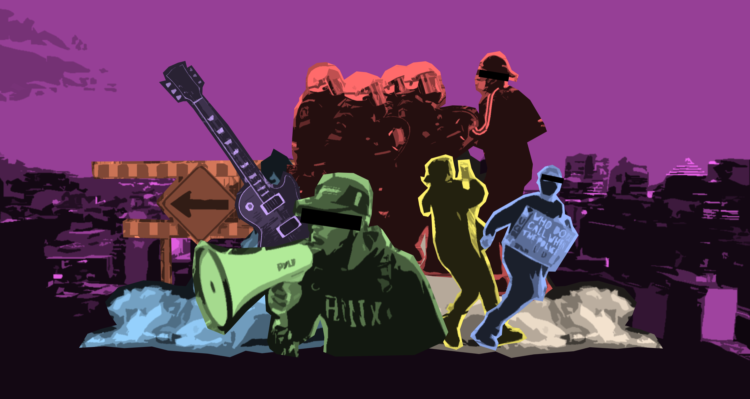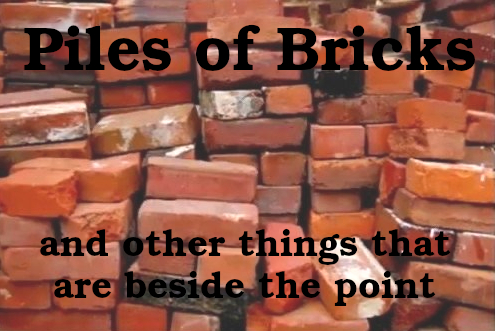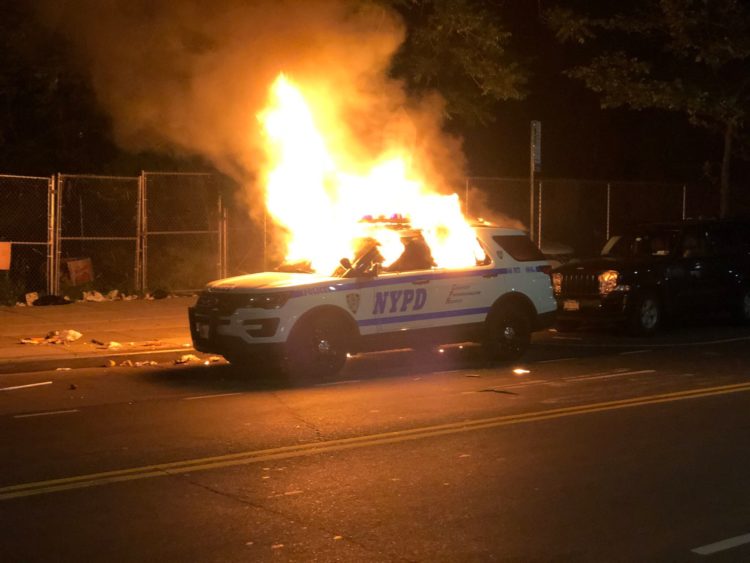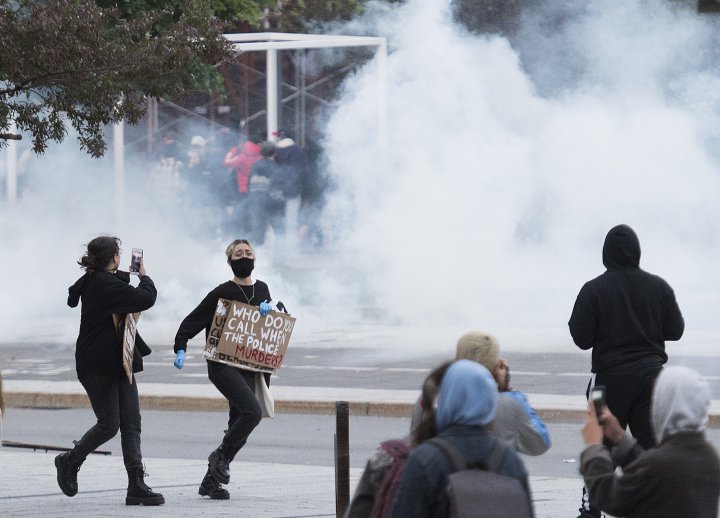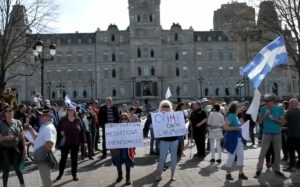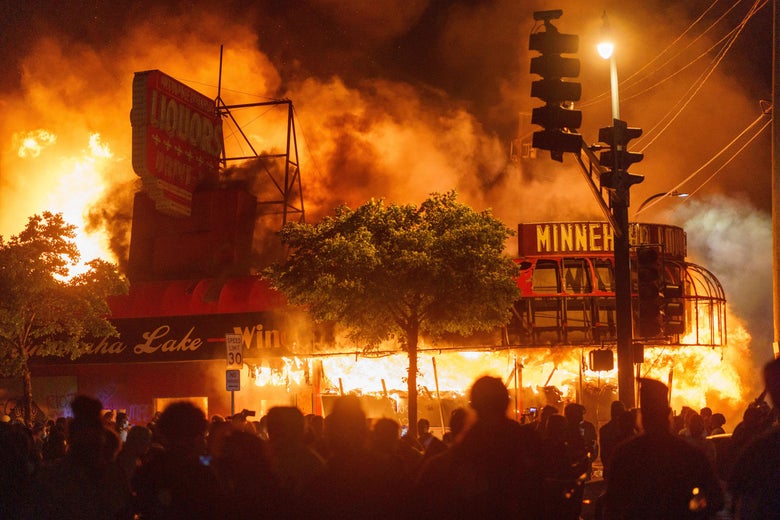
Anonymous submission to MTL Counter-info
The following is an interview intended for an international and revolutionary audience. It includes questions from the Greek anarchist radio project RadioFragmata regarding the insurrection against white supremacy happening in the USA. The interview is with members of RAM (Revolutionary Abolitionist Movement) and anonymous anarchists from the USA. It is intended to help explain the circumstances and events happening in the USA.
“Being an old farm boy myself, chickens coming home to roost never did make me sad; they’ve always made me glad.” – Malcolm X
What is happening in the USA right now, and how is it different from other recent uprisings that have happened in response to police violence such as Ferguson, MO in 2014? Is there a different feeling in the streets?
This uprising in the US is mainly different in its fury and its magnitude. Other moments, like Ferguson or the LA riots in 1992 were significant and laid the groundwork for this moment, but today we are seeing a movement that is radically different in a lot of ways.
The youth in the streets are very knowledgeable about abolitionist politics. The youth have dismissed patience and hope for reform, focusing only on immediate and direct action. A lot more people also seem to realize that reformism is a dead end this time around. The level of intensity is extraordinarily significant. The fact that people burned down a police precinct in Minneapolis, chased the police out running for their lives, and continued as the military was called in, is unprecedented. The other fact that the majority of the country supported burning down a police station and the plague of pacifism has lost its foothold on protest, has really reshaped the type of dialogue we are used to in the states. Support of insurrection and riot from unexpected groups and individuals is shocking at times to the say the least. Predatory fence riders are essentially being forced to come down and pick a side. Are you a racist, or are you an anti-racist?
The intensity of revolt that began this time in Minneapolis, has since spread across the country like a wild fire. The wide-spread level of generalized revolt, the intensity of the resistance, and a complete loss of faith in reform and patience in the system is unlike anything I have ever seen in my lifetime.
How are anarchists and/or anti-fascists in the states showing solidarity during this insurrection? And what suggestions do you have for anarchists and/or anti-fascists around the world to show solidarity from afar?
Anarchists and antifascists have participated from the beginning of these rebellions. The movement has explicitly focused on policing, prisons and its appendages for quite some time now. So this moment of rebellion is very special for us.
But we should be clear; this wasn’t an uprising sparked by anarchists. The rebellion is driven by black youth who are tired of being dehumanized and murdered. Anti-black violence and white supremacy is the cornerstone of US political, economic and social life. It is so entrenched that reform is impossible. We as anarchists have long held this position and have fought and organized to destroy this situation, but we are just one of many political tendencies that have been taking part in this insurrection.
Around the world the most important thing for anarchists to do is to intensify political and economic pressure on the US and contribute to local tensions and resistance against police. Target anything and everything that makes the United States function and powerful, while further generalizing and empowering the discontent that inspired the uprising to begin with; targeting local racism, the police, and other appendages of domination and exploitation. The US is incredibly weak now and the weaker it gets the better it is for us here and for people around the world in general. Additionally, any act of solidarity gives strength to those of us in the streets. Solidarity is strongest in a shared attack that knows no borders!
How is it that some people claim to support the rebellion in the USA but backtrack due to so-called “violence”?
In the US, the concept of “non-violence” as practiced by Martin Luther King Jr., a civil rights leader in the 1960’s, is held up and celebrated, in hindsight, as the perfect expression of activism. By extension, protest is seen as an expression of activism. Thus, all legitimate and supposedly “effective” protest should bare a lot of resemblance to these principles of non-violent protest which are reported in history for single-handedly achieving civil rights in America. In reality, the situation was much more complicated and frequent insurrections in major cities also played a very big role in the state passing new laws that abolished formal/legal segregation in the southern US (Jim Crow; only to eventually readapt methods of oppression). Nevertheless, the official narrative gives non-violence all the credit. Furthermore, the narrative is that every protest must be to advance a legal cause, not a revolutionary movement. Sometimes even revolutionary sounding rhetoric (Such as Killer Mike of Run the Jewels, known democrat and son of a police officer using deceptive language to denounce protesters following attacks on CNN headquarters and the police) is used when talking about changing laws or achieving other basic reforms. Any American action in the streets that is truly revolutionary or is violent is generally considered illegitimate, because of the aforementioned beliefs about what legitimate struggle looks like that is culturally very powerful. This is another reason why the events that have happened are so inspiring because they totally reject this logic and this narrative. The degree to which the uprising spread to such a diverse array of cities shows how widespread the dissatisfaction with this narrative has become. A partial explanation is that the people acted before any formal leaders had a chance to try to assert themselves as representatives of the movement. The truly organic nature of the movement has been its strength from the beginning and what has allowed it to break free from what otherwise would have been protests carefully orchestrated by professional activists and politicians.
People are conditioned from a young age to seek faith in the theater of democratic politics. Violence is the negation of such a faith. Violence is a demonstration of self-determination, it demonstrates a desire to seek a world beyond the present.
We are taught that we have rights, but rights are choices that can be taken away, as they are set by a social contract that is maintained by authority. Rights are nonsense, deceptive options that are used to instill the fear that lies at the basis of today’s social peace. You have your rights, your freedom(S), and if you behave according to the laws of the box that contain these choices, you will not go to prison. Rights are imaginary, and typically only assumed to have validity by the included and beneficiaries of a stratified society. This is a very important thing to remember when judging the voice of a proclaimed ally contesting political violence or self-defense.
Violence and physical revolt recognizes a rigged playing field. It demonstrates a will to go further, a desire that can not be controlled by a system that can at any moment take away such rights. The voices that take an issue with violence are speaking a language of faith in the justice and politics of a system responsible for inspiring revolutionary violence to begin with. These voices will encourage you to plea, to wait, and to hope.
Activists, liberals, and so-called allies supporting from the bench are quick to denounce violence because they have faith in the options the current theater of politics present for change. They want to re-appropriate the existing powers, as oppose to demolish them. In some cases they are also afraid, and instead of humbly recognizing their fear of being punished for courageous risk and resistance, they huddle like cowards behind various critiques of violence.
On the other hand you can wonder why we grow up learning about Martin Luther King and Ghandi, rather then such historical figures of the same time and place such as Malcolm X or Bhagat Singh. The right, the powerful, or the systematic and calculated methods of self-preservation by capitalist society will always denounce revolutionary violence and insurrection. This is simply because this type of resistance is what they fear, this type of resistance threatens their status, and the system that maintains it.
Violence is a neutral subject. Two people can be holding a gun, and it be a totally different situation. One person (Patrick Crusius) can hold a gun in order to murder immigrants and people of color at random in El Paso, Texas, while another person (Chrystul Kizer) can hold a gun to kill a man who raped and trafficked them.
One may say we are only discussing George Floyd because he was fortunate enough to have had his lynching caught on tape. However this is not why we are still discussing George Floyd. People are tortured and murdered across the United States every single day. And in many cases it is caught on video. But the real reason we are still talking about George Floyd after his death, is because this particular incident sparked a generalized revolt of what I would consider a positive type of violence that the police could not control.
Has the coronavirus played a role in the current insurrection?
The coronavirus definitely played a role in the rebellion. There are several main factors here. The economic fallout has left millions of people helpless. There are millions without work in the US. Having a job in the US also does not mean escaping poverty. The unemployment rate does not truly reflect the percentage of people struggling to survive; those working jobs that do not cover their day to day expenses are considered to be employed. The level of precariousness is enormous. Then you have an entire country stuck inside and restless, particularly the youth.
Black people in the US have died of the coronavirus at at a rate three times higher than white americans due to a consistent lack of access to quality healthcare. There was a huge lack of testing in poor communities, but this is intentional. People have little access to healthcare in general, and quality medical assistance is reserved for more affluent communities. People in working class communities continued working and taking public transportation during the pandemic in order to survive. This made the virus spread in more extreme ways, but particularly to marginalized communities.
Quarantine also highlighted divisions and privileges in society. The rich were able to escape dense cities and isolate in luxury. People who lost their jobs and were offered scraps by the government as huge companies and the rich received unprecedented bailouts. The richest few had their wealth increase by over half a trillion dollars, while everyone else was home wondering about the next week, the next bill, or the next meal.
Poor people, Black and brown people, native people, and the excluded demographics of the United States took a massive hit from the virus. There was no pretending anymore about whose life matters and whose didn’t as the state contained oppressed peoples inside petri-dish like virus-filled prisons and immigrant detention centers — acceptable death zones populated by capitalism’s expendables. Furthermore, the workers who were deemed essential during the pandemic to keep society functioning were among the least rewarded and most exploited in society prior (Nurses, agricultural workers, grocery store workers, and so on). This allowed people to realize the absurd logic of capitalism and begin asking questions that many Americans have never even considered. Instead of raises and protection, these workers were only greeted with patronizing praise from the rich and powerful as “heroes”, while such petty appreciation is obviously insulting when someone is risking death and the spread of the virus to their loved ones. People’s eyes were open to a point that no deception offered by the supposed american dream could distract people from the nightmare that is most american’s everyday life.
When the Trump administration also began noticing that non-white and lower class demographics were being affected by the coronavirus at much higher rates then his almost exclusively white fan base, he and his media apparatus began a blatantly racist push to re-open the economy and as Trump put it: “let the virus wash through”.
So due to these systemic, structural reasons the Black community was by far one of the most affected by the coronavirus in the country. On top of all that, when the state demanded people begin social distancing the police immediately began terrorizing Black communities for not following orders. Even as the country was in lockdown, police found a way to keep the numbers of people murdered by them as high as they were in recent years. And with people being home, many had all day to view videos of police murder and torture in the streets as they happened.
The coronavirus became a formula that helped to turn the country into a powder keg.
Is race the only issue driving this uprising?
The insurrection is predominantly about white supremacy, policing, and the prison system (13th is a quality film on this subject). Heinous murder of Black youth is the norm in the United States, and people finally had enough.
Class also plays a fundamental role in the uprising, as it does in all capitalist societies. However, this uprising was totally driven by the Black working class which has a very different character than the activist movement in the US which is often from bourgeois backgrounds and approaches politics as a hobby as opposed to indispensable struggle. Due to this reality the character of the original uprising was pretty open to whoever wanted to participate, and acted without fear of judgment by the racist morality of the status quo.
It should also come as no surprise that while the unemployment rate has skyrocketed to levels not seen since the great depression, people are now fighting back against the system. If the movement can retain this working class ferocity and fluidity the potential for revolutionary change is greater than it’s been in a lifetime.
What are some of the origins of white supremacy in the USA?
The origins of white supremacy in the US are the origins of the country itself. The US was founded as a white supremacist project explicitly. Built on the backs of the enslaved African population and the genocide of the indigenous, the US established itself as the model nation for white power. In its early laws they claimed Black people were only three fifths of a human and were viewed as property until 1865. After that the government did everything in its power to ensure the foundations of slavery remained, transferring the process from plantations to the prison industrial complex.
But this process started with early European expansion around the world. The US, in actuality, is a project built from European thought and politics. Both continents are historically entangled with extreme racial regimes and mass slaughter and genocide. Additionally, the status of economic and political power maintained on both continents come at the expense of historical colonialism that has come to define the global mapping of the 1st and 3rd worlds today.
What does it mean to be against white supremacy? Are there elements of reverse racism in this struggle?
First off, reverse-racism is not a thing. It is an oxymoron.
Racism isn’t simple prejudice but a system of oppression and because there is no racialized system of oppression that whites are subject to, they cannot be victims of racism.
“White” in American society is an established demographic that has some pre-existing advantages on its own. For example, while many white people in America suffer due to poverty, there are still inherent advantages to being white. One great example is the ability to go jogging at night without being seen as fleeing a crime.
The ruling class has determined throughout history that there is to be a calculated delegation of suffering. The notion of the savage, the inferior non-gentile /dark skinned populations of the world established by European conquest is a critical origin as to the demographics chosen to suffer in the world today. Approaches and language used by oppressing/ruling populations have been modernized and adapted, but the foundation remains the same. White means to be included, to have a better seat in the stadium without condition.
While overall Black people in the United States have a 250% higher chance of being murdered by police (that’s according to official numbers, the real number is likely higher overall, and varies by region and level of diversity), many of those murdered are also poor white people. The ruling class does not spare the excluded white population, and having a critique of white supremacy does not forfeit a recognition of white people suffering under capitalism. But it is essential that we recognize that a contempt for being white is a frustration with the race that has been chosen by this system as included and defended. White people are included and defended, at the expense of, and from, so-called inferior non-white demographics. While the oblivious or racist make claims of reverse-racism, others have recognized the same gestures of frustration against white supremacy as logical contempt.
There are some Black separatist groups* that exist, but their calls for separation stem from a desperation to escape the relentless infliction of misery that comes not from a diverse society, but a diverse society that has been stratified based on race and ethnicity. Such a desperate call for Black power through segregation comes from the experience of knowing a diverse society that has one race delegated to reign supreme.
Across the United States, as diverse as it is, and regardless of its deceptive civil rights acts, people remain brutally segregated. Whether by class or race, the United States presents some of the most intense close-proximity segregation in the world. Look at New York City for example, where you have some of the poorest parts of the country and wealthiest neighborhoods in the world existing side-by-side, separated by the beast of the police and their judicial system. Many non-white communities do not even interact with white people in daily life unless it is white police invading their neighborhoods and maintaining their poverty. In no way at all am I ignoring the plight of white working class communities, but there are volatile disparities that scream back at those claiming “all lives matter” with an acid that will seal their racist lips. Two and a half million people are in prison in the United States, many innocent, many white, and many poor. In no way do we dismiss the poor white people, but in a country roughly 13% Black, and a prison population almost 40% percent Black, the gaslighting efforts behind claims of reverse-racism or “all lives mattering” are mathematically invalid.
What is falsely deemed “reverse-racism” is actually an understandable frustration with a demographic that has power due to the suffering of another demographic. You can be white and despise what it means to be white in the world today.
There have been instances in past riots, such as the 1992 Los Angeles riots, of whites being randomly attacked for simply being white. While this was in the minority of overall inspiring events that happened, they were one unfortunate result of an explosive situation. This is not something that has been present in the current uprising. The current uprising has been remarkably diverse right from the beginning in all its expressions and despite the participation of millions, there has been no real serious examples of inter-racial violence occurring. On the contrary, at least prior to the involvement of false leaders, there has been a remarkable sense of unity, even in spite of individual disagreements on strategy and tactics and people coming from different political backgrounds. Serious objections to violence, looting, etc. have almost exclusively come from outsiders who have not been on the streets and from some of the peaceful protesters now filling the streets, following a narrative the media has handed them about what “legitimate” protest looks like. Many of those peaceful protestors are now being subject to widespread police violence, which will hopefully radicalize many of them. In this way, the system is helping make our points for us to these newer more peaceful demonstrators.
* Many Europeans appear at times to fetishize any semblance of the original Black Panther Party, especially in the form of using images of the New Black Panther Party posing with weapons to proclaim solidarity with black struggle. It is important to note that the New Black Panther Party is not the same as the old Black Panther Party or the Black Liberation Army. It has been rejected by almost all surviving members of the original Black Panther Party and Black Liberation Army, including those still serving time in prison for their actions. The New Black Panther Party is a viciously authoritarian, antisemitic, pro-segregation, and anti-gay organization. The guns they carry are all legally owned firearms in the USA.
How do anarchists in the states find solidarity with people who are not formally anarchist?
We do not have the numbers to function with blinders on. Additionally the sincerity of rage and passion for freedom that come from experience can outweigh the alleged enlightenment of any theoretical understanding. We also live in an intensely diverse society, and have to challenge ourselves to break out of the insular thinking of classical anarchist organizing.
In the states we must adapt to the circumstances we face, and challenge ourselves to focus on deeper elements of tension and discontent, that transcend the superficiality of political identity.
We find our solidarity standing horizontally with a discontent of experience. When the streets escalates resistance we look to board ship . Anarchists in the states seek a solidarity of shared enemy and shared frustration. Maybe those we seek to fight alongside do not have recite the same rhetoric or proclaim the same ideology, but our priority is to seek the hand of those that share our rage with this system and act accordingly.
Is looting something perceived as revolutionary? Do you support the looting politically? Do you take issue with the judgments of liberals regarding the ethics of looting?
No I don’t take issue with looting. Nor do I show any respect to the morality that lies at the foundation of capitalist society. To take issue with looting implies a non-issue with the status quo needed in order to “appropriately” purchase products.
Let me put it this way: the wealthy of New York City looted stores across the city in order to be prepared for lockdown and quarantine as the Coronavirus Pandemic loomed. Generally speaking, it was only in some small stores in very poor neighborhoods that some home essentials for quarantine could be sparsely found. Many poor people are unable to purchase in bulk, as most work paycheck to paycheck and the notion of investment of any kind, even an investment into the coming days of a quarantine, is not an option.
Stores across NYC were emptied of toilet paper, disinfectants, personal protective equipment, food, and whatever the rich could get their hands on. The rich “legally” looted the stores, and hoarded safety. They did this on their terms; the same terms that define purchasing power within capitalism. The terms that calculate and delegate suffering.
Looting is an act of defying these terms. It is an act that exposes the fragility of these terms that the police and justice system exist to maintain and enforce.
No product accounted for by global capitalism can be measured against an everyday life of suffering with origins in formal slavery. To denounce looting in the context of a social insurrection gives praise to the notion of purchasing in accordance with the terms defined by the ruling class’s putrid morality.
Looting in the context of a social uprising, in most cases threatens the reification of the ‘sacred’ purchase; essentially breaking the barriers we are conditioned to accept that exist between poverty and life. However, looting and the social violence of an insurrection is not always perfect. There have been some small businesses burned in Minneapolis for example that certainly didn’t deserve compared to other available targets. As Alfredo Bonanno has said, insurrection “is a blow of the tiger’s claws that rips and does not distinguish. Of course, an organized minority is not the insurgent people. So it distinguishes. It has to distinguish.”
As far as I’m concerned, to take issue with looting (especially if it targets big businesses and exclusive commodities) is to advocate for purchasing. It resembles a voice that comes from a position of privilege; the privilege to not feel desperate. It also stems from a position that is concerned with the judgment of the included and benefited in this society.
Looting can be beautiful and sad at the same time. I understand also the concerns regarding the materialistic elements of some types of looting, but I don’t think this outweighs the broader revolutionary implications. I am sad to see a small business owned by a struggling family be scooped up by the vacuum of rage that is a riot, but on the other hand I smile seeing poor people sporting fashion symbols of the rich and shopping at Wal-Mart without a wallet.
As an anarchist, with a limited voice in the world of politics, I refuse to even for a second, consider denouncing an uprising due to looting.
There are plenty of voices on the right and in power that believe in the sanctity of the purchase, and use such a belief to demonize, divide, and degrade an insurrection. These are well funded voices that are preserved by this society in order to support the genocidal normalcy that inspired an insurrection in the first place. If you use your voice to degrade or demean gestures of self-determination and rebellion you can not sincerely claim to be an accomplice to an uprising. Those in power protecting the status quo will use their well-funded media apparatus to demonize and divide the insurrection; the so called participants/supporters should not.
If you take moral issue with looting it may be important to look within your own claim to support an uprising against white supremacy, capitalism, and the state. Because you are asserting a logic that rewards institutional looting, domination, and exploitation, and looks to punish or be cautious of any grassroots efforts of revenge and/or self-preservation.
A very eloquent defense of looting in the context of a Black uprising was put forth by the situationists as early as 1965 and is as relevant as ever:
“The looting of the Watts district was the most direct realization of the distorted principle: ‘To each according to their false needs’ — needs determined and produced by the economic system which the very act of looting rejects. But once the vaunted abundance is taken at face value and directly seized, instead of being eternally pursued in the rat-race of alienated labor and increasing unmet social needs, real desires begin to be expressed in festive celebration, in playful self-assertion, in the potlatch of destruction.
[…]
Looting is a natural response to the unnatural and inhuman society of commodity abundance. It instantly undermines the commodity as such, and it also exposes what the commodity ultimately implies: the army, the police and the other specialized detachments of the state’s monopoly of armed violence. What is a policeman? He is the active servant of the commodity, the man in complete submission to the commodity, whose job it is to ensure that a given product of human labor remains a commodity, with the magical property of having to be paid for, instead of becoming a mere refrigerator or rifle — a passive, inanimate object, subject to anyone who comes along to make use of it. In rejecting the humiliation of being subject to police, the blacks are at the same time rejecting the humiliation of being subject to commodities.”
– Situationist International, “The Decline and Fall of the Spectacle-Commodity Economy”, 1965
Why are there so many accusations of conspiracy theories behind the protests, and also this claim of outside agitators?
The US is an odd country. The prevalence of conspiracy theories is shocking. People who are often for the status quo often believe really outlandish theories here. In many ways this is indicative of the rapid decline of the US as a power. Its population is now so tremendously misinformed they often don’t know very basic facts. For instance, there’s a growing, and sizable group of people that believe climate change is fake, antifa is funded by George Soros, and the world is flat.
Furthermore, people are so detached and so fixated on their devices they have a hard time believing anything is ever real. So whenever anything happens many people think it’s fake. However the state also understands how to leverage this. Over 150 cities/towns had protest activity. The government claims outside agitators have launched the rebellion even though it makes literally no sense. Historically the government has always said this about Black liberation movements. Part of it is racist. The state believes, or wants people to believe, that Black people are incapable of doing anything without a white hand. And on the other side, if it is “outsiders” then the state can argue the movement is illegitimate.
Following the first and second world wars, a relentless terror campaign by the FBI to eradicate the left, anarchists, and anyone challenging the status quo went into full effect. This lead to future generations of apolitical people knowing nothing more then democrat versus republican. Periods of political resurgence appear throughout history since this period (Anti-war movement in the 60s, armed struggle groups in the 70s, anti-globalization movement in the 90s, and so on), however most people in America are not taught to be political the way most are in rest of the world. Generally we are taught to be culturally liberal or conservative, and embrace political variations of the right wing. Most jump into prescribed political narratives that don’t challenge much of anything. So the appealing shock and awe of conspiracy theories is fairly understandable, and sadly these help keep people divided and distracted, fixated on trees as opposed to the forest.
In europe these kind of extended riots go hand in hand with big strikes. Are there big strong unions (maybe leftist some of them) during this period that could start a big strike?
The U.S. unions have generally been coopted by a right wing mentality and barely resemble their radical roots. Of course wildcat strikes of transportation could considerably damage the powers that be, but the country was already at a sort of surreal standstill due to the quarantine, with very few working at all, and only “essential” U.S. infrastructure being used.
Some gestures of solidarity were made by bus workers refusing to drive demonstrators to prison for example, but generally unions and wildcat strikes are very rare and equally unlikely in the USA. In a consumer economy with most industry automated, the few manual jobs are usually done by the most exploited of immigrants, and if they were done by union labor, such jobs typically end up being exported to a country where labor is cheaper. However, what did happen leading up to this was massive coordinated rent strikes due to massive unemployment, and huge networks of mutual aid being built across the country. Whether coincidence like the virus itself, or a precursor of organizing towards general revolt, any wild cat strike in the complicated economy of the USA is typically done on an organic social level as opposed to throughcoordinated union effort.
Will Trump’s declaration to recognize anarchists and anti-fascists as a terrorist organization lead to increased repression? What type of support can you anticipate being needed in the near future, or now?
Trump’s threat to label anarchists and antifa as terrorists will almost certainly increase repression here. In many ways it is a sign of political weakness and desperation. Trump, Barr and the rest of the clowns in office know perfectly well anarchists are not solely responsible for these uprisings. But they can’t say “we have been killing and destroying Black people for decades so they rightfully rose up in rebellion.” They need a scapegoat.
The state and media are desperate to recuperate and restructure the response and narrative of the demonstrations. However recuperating an insurrection that is de-centralized, spontaneous, and organic is quite hard without an imaginary boogeyman to place all the blame on. We are not surprised by this response, nor is it the first time anarchists have been considered public enemy #1 in the united states.
So the likelihood the movement will come under attack is very high. But none of us are afraid. None of us are surprised. Everyone has realized that the US is weak and can only rule by terror. Once people are no longer afraid the regime’s power substantially weakens. The greatest support we can ask for is to continuously attack the U.S. Keep attacking until this wretched empire is a thing of the past.
Over ten thousand people have been arrested that we know of. We also know that in the streets you not only have local police forces, but you have ICE (Immigration and Customs Enforcement), the FBI, and various other agencies tracking, surveilling, and in terrogating arrested demonstrators. Already you have people facing long-term prison sentences for throwing malfunctioned molotovs under the charge of attempted murder. Even prior to all this we have a long term anarchist prisoner serving 10 plus years for throwing a non-functioning molotov cocktail at a federal building.
Trump and his “law and order” response is a call for a counter-revolutionary and state repression campaign that is as unprecedented as the insurrection that has been sweeping the streets of america.
Sadly liberal activists and media have been part of the attempt to cast out anarchists and anti-fascists. Blaming violence on so-called white provocateurs, posting information online about suspected rioters and evenliberal activists tackling demonstrators who commit property damage and turning them over to the police are among the disgusting things happening as reformist groups begin to co-opt the dialogue.
Instead of recognizing the solidarity in the actions of anarchists and anti-fascists participating horizontally in the riots, many of the middle and upper class politically-correct world, as well as liberal Black leaders pandering to the white mainstream, degrade the courageous violence against the police by dismissing it as “political opportunism by white agitators.” Regardless of this absurd claim that falls in line with other liberal conspiracy theories, we all know that anarchists and anti-fascists play a much less significant role in the severity of resistance then informally political Black, brown, and working class people simply fed up with the misery of everyday american life. As anarchists we do however dismiss the accusations of coopting Black struggles, and will forever take a stance as accomplices to an insurrection against white supremacy, as opposed to allies supporting from the safety of computers and ballot boxes.
So much is happening, so much is expected to continue happening, and information at the moment is overwhelming. However we are including with this text a list below of bail funds, anti-repression groups, and frequently updated websites regarding the on-going uprising.
Bail Funds – Huge compilation of bail funds and support groups created during and used for the current uprising.
Abolition Media Worldwide
Revolutionary Abolitionist Movement (RAM)
NYC Anarchist Black Cross
